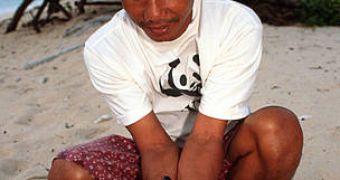WWF officials are working in partnership with Banco de Oro Unibank (BDO), with the purpose of raising young people's level of awareness regarding the climate change phenomenon that is threatening biodiversity.
The Seeds of the Future foundation is trying to improve the eco-conscious conduct of public elementary students, taking into consideration that education is the first important step towards a successful eco-friendly campaign.
WWF is trying to highlight the importance of environmental preservation by stressing that there is an important connection between climate change and the condition of the ecosystems in Philippines.
Only after learning this lesson, the pupils will be able to minimize their ecological footprint, by making the right decisions. One small step for the organization might imply a huge progress for the entire population.
This strategy follows a familiar path for WWF representatives, since they have already engaged their efforts in a campaign meant to raise enough funds to power the field programs, counting on the help of BDO.
The bank's contribution is quite significant, given that it allows ATM users to redirect five Philippine pesos ($0.114/ 0.084€) for a noble green cause. The money goes to support a new whale shark exhibit, which will be showcased by the Donsol Visitor Center in Sorsogon from December 2011.
All in all, the WWF does not want to limit its influence in that area to only a few established goals, and is planning to involve its staff in a Mangrove planting process, all across the country. This is an action definitely in favor of the environment, that will reestablish the fragile balance of the ecosystem and will improve the air quality in the region.
WWF officials also have in mind a watershed management project, meant to increase seafood supply. It appears that theory won't be put into practice in a dull, traditional manner.
In order to preserve and harness teens' interest in the idea, the foundation intends to hold interactive teaching programs starting January 2012. Games and videos will certainly make the learning process more enjoyable and entertaining.
Donations through the same system are still encouraged, since proper funding appears to be a key factor in changing the inhabitants' behavior and ensuring biodiversity conservation.
At this point in time, fighting man-made pollution seems to represent the main challenge. Present actions can provide a safer framework for a sustainable future.
WWF's new project entitled Seeds of the Future is keen on annihilating the sources of pollution that put the ecosystem in great danger, starting with the common harmful plastic bags and ending with the trash discarded in an irresponsible manner all across Manila Bay.
“Trash thrown carelessly in Manila Bay might choke a sea turtle in far-off Batangas. Through constant browsing, sea turtles keep seagrass meadows pruned and healthy. Healthy seagrass meadows provide commercially-valuable fish and invertebrates with refuge," say the officials from WWF.
"Will fishing communities survive when the turtles don’t? Everything is connected – reducing our use of plastic bags directly impacts levels of biodiversity,” the WWF representatives add.

 14 DAY TRIAL //
14 DAY TRIAL //